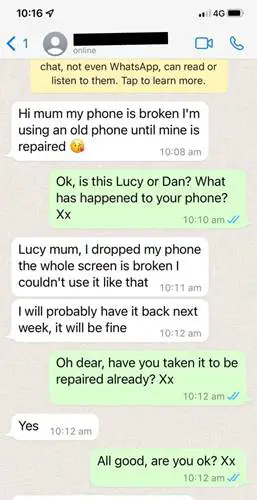In the digital age, instant messaging platforms have become a prominent part of our lives, connecting us with friends, family, and colleagues. WhatsApp, being one of the most popular messaging apps worldwide, offers convenience and seamless communication. However, this widespread usage also attracts malicious individuals seeking to exploit unsuspecting users. In 2023, WhatsApp scams continue to evolve, becoming more sophisticated and deceptive. To help you stay one step ahead, we’ve compiled a comprehensive list of the 10 most common WhatsApp scams and what you should do to avoid being scammed.

10 most common WhatsApp scams and what you should do to avoid being scammed
1. Fake Prize Giveaways
Scammers often lure unsuspecting WhatsApp users with messages claiming they have won a substantial prize or gift voucher. Moreover, they may request personal information or ask you to pay a fee to claim the prize.
What you should do: To avoid falling victim to this scam, remember that legitimate giveaways don’t require upfront payments or personal details. Additionally, be skeptical of unsolicited messages and cross-verify the information with official sources before taking any action.
2. WhatsApp Gold
The infamous “WhatsApp Gold” scam resurfaces in 2023, promising exclusive features and enhanced functionality. However, there is no such official upgrade. Furthermore, clicking on links claiming to offer WhatsApp Gold can lead to malware installation or phishing attacks!
What you should do: Delete the WhatsApp message immediately and do not forward to anyone! Also, protect yourself by only downloading apps or updates from trusted sources like official app stores.
3. Impersonation Scams a.k.a. ‘Mom and Dad’ Scam
Scammers exploit trust by impersonating someone you know, such as a friend, family member, or even a company representative. Consequently, they may request money or sensitive information, preying on your emotions or urgency.
What you should do: A simple way to defeat the ‘mom and dad scam’ is to set up a distress password with your children. You’ll always know if it’s them or not. Always verify the identity of the person through an alternative communication channel before sharing any personal or financial details.
Read also: How to Hide Your WhatsApp Profile Picture from Specific Contacts
4. Investment and Crypto Scams
WhatsApp has become a favored platform for investment and cryptocurrency scams. Consequently, fraudsters promote fake investment opportunities, promising high returns or exclusive deals.
What you should do: To protect yourself, conduct thorough research before investing in any scheme. Also, be cautious of unsolicited investment advice and avoid sharing personal or financial information with unknown individuals.
Read also: How to Spot a Scammer
5. Job Offer Scams
Scammers exploit the job market by posting fake job offers on WhatsApp, targeting desperate job seekers. They may request an upfront fee for application processing or promise lucrative positions that don’t exist.
What you should do: Stay vigilant by researching the company and job opportunity independently. Remember, legitimate employers will not ask for payment before offering a position.
6. Phishing Attacks
Phishing attacks remain a prevalent threat in 2023, with scammers sending messages that imitate official WhatsApp communications. Consequently, these messages often contain links that direct users to fraudulent websites designed to steal personal information.
What you should do: To protect yourself, never click on suspicious links, and double-check website addresses for authenticity before entering any sensitive data.
Read also: What to Do When You’ve Been Hacked (Vital 10 Things to Do)
7. Voice Message Scams
Scammers send messages claiming to have a “shocking” or “urgent” voice message for you. Upon clicking the provided link, malware may be downloaded onto your device, compromising your security.
What you should do: Avoid clicking on unexpected voice message links, especially from unknown senders. Enable security features on your device, such as antivirus software to mitigate risks.
Pro Tip: Having problems receiving WhatsApp messages? Discover 12 effective methods to fix WhatsApp not receiving messages and get your messaging app back on track!
8. Charity Scams
During times of crisis, scammers take advantage of people’s generosity by posing as charitable organizations and soliciting donations on WhatsApp.
What you should do: To ensure your donations reach legitimate causes, research the charity independently and donate directly through their official website or verified platforms. Be cautious of sharing personal information or making payments through unofficial channels.
9. Romance Scams
Scammers exploit emotional vulnerabilities by pretending to form romantic relationships on WhatsApp. Therefore, they may eventually ask for money under the pretext of an emergency or financial need.
What you should do: Exercise caution when interacting with individuals you meet online and avoid sending money to someone you haven’t met in person. Report suspicious accounts to WhatsApp.
10. Subscription and Billing Scams
Scammers trick users into subscribing to unnecessary services or charging exorbitant fees by sending deceptive messages that mimic legitimate subscription notifications.
What you should do: Be cautious when providing payment information and carefully review your billing statements. Moreover, verify the legitimacy of any subscription or payment request directly with the service provider.
Read also: The Top 10 Dangerous Emails You Should Never Click On
WhatsApp scams: trends and precautions [conclusion]
WhatsApp scams continue to evolve, targeting users with increasingly deceptive tactics. By staying informed about the latest scam trends and implementing essential precautions, you can protect yourself and your personal information from falling into the hands of scammers. Remember to exercise caution, be skeptical of unsolicited messages, and verify information independently.
Stay vigilant, and together we can create a safer WhatsApp environment for everyone.
Read also: Beware of Whatsapp Pink – It’s a Scam!

